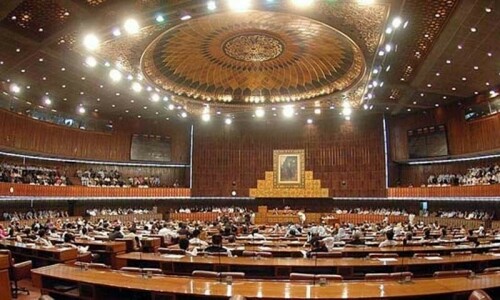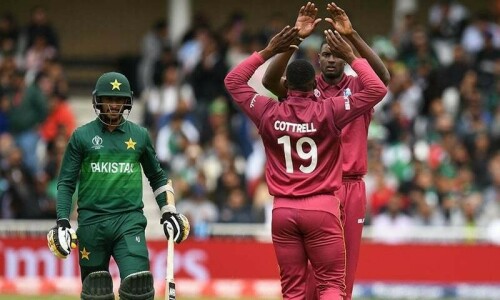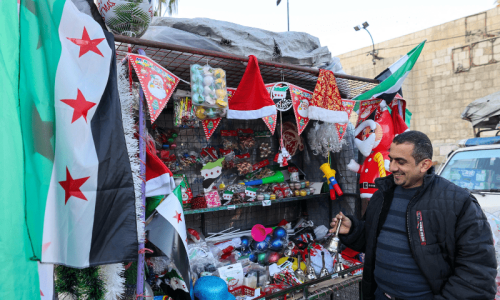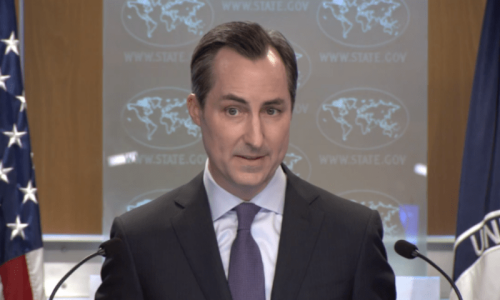PAKISTANI politics is a gift which keeps on giving — to the language we speak. And the recent buzzword for the state of politics in our land is ‘hybrid regime’. It’s descriptive, pejorative and analytical all at once; it can be used to criticise any party in power and explain inexplicable happenings.
A phrase which became rather popular during the PTI tenure, it didn’t fall into disuse even after the party was sent packing. The PDM government was described in no less complimentary terms once it ‘settled’ down, disappointing some and vindicating others with its inability to govern.
Before long, the ‘hybrid regime’ tag was upgraded to hybrid plus. Once the elections took place, the plus wasn’t deemed enough and the phrase became ‘hybrid plus plus’ or ‘hybrid promax’. This is now as much a part of our conversations as ‘khalai makhlooq’ once was.
But as a phrase and its connotations it does raise questions. In a country where civilian governments have always been hampered and compelled to cede power to or share it with the establishment, is it only recent governments that deserve to be called ‘hybrid’?
Is it only recent governments that deserve to be called ‘hybrid’?
After all, Benazir Bhutto’s first government was able to come into being only after she agreed to accept that those running finance and foreign policy would be appointed by those who had ‘kindly’ allowed her to become prime minister. Once ‘they’ decided to send her packing, Nawaz Sharif was brought to power in an election, which was perhaps the most controversial and manipulated of the four polls held in the 1990s. It was also the only one of the many controversial elections in Pakistan to have been challenged in the Supreme Court. After the 2008 election, story after story reported how then chief of army staff Ashfaq Kayani held meetings on the economy at his office in Rawalpindi attended by the relevant federal ministers.
So what makes it different post-2018? Is it even different? Perhaps last weekend’s sorry saga of the constitutional amendment that wasn’t provides some enlightenment.
For months, talk of a constitutional package was doing the rounds. And for days if not weeks, the government told us the numbers were in the bag (or was it the maulana who was in the bag?) as the president, prime minister and interior minister went a-calling. But the presence of the last heavyweight made it more than evident which stakeholders were behind this bout of lawmaking. And yet, once the operation turned out to be as successful as Joe Biden’s second election run, the guns were turned on the political government only.
From ‘independently’ elected senators (this election has given us not just the PTI-allied independents but also a cast of independent senators) to powerful journalists, no one was willing to mince their words about the government’s incompetence in getting the job done. But was it simply the government’s failure? Who can afford to ask this question?
Perhaps, this is what distinguishes what we call the ‘hybrid system’. It is one in which the relationship between the government and establishment works at two levels: officially the claim is that of a close relationship while at the unofficial level, a different picture is painted.
This doublespeak starts with the election; not only are polls questionable to begin with but the controversy generated is kept alive. The election continues to be called into question even as the government is formed. Constant references to RTS and Form 47 keep the election controversy alive in people’s minds; the unceasing talk about Nawaz Sharif’s Lahore election is a case in point.
This is accompanied by constant, unsubtle references to ‘one page’. The government and establishment are working in coordination with each other; as the government has been put in power by the establishment, the widespread assumption is the latter will support the former. Publicly and officially, this is mentioned again and again. While the PTI spoke proudly of the ‘one page’, Prime Minister Shehbaz Sharif went a step further to speak of the chief and him being ‘yak jaan do qalib’ (best friends).
Along with these public pronouncements, however, is the unofficial messaging, which is no less vociferous. This messaging, carried out during closed-door meetings and background briefings, together with the analyses of media people with sources aplenty, is used to explain how the establishment is tiring of the incompetence of a government which refuses to stand on its own feet.
All of this builds up an image of a government which was helped into power at great cost but has since disappointed those who propped it up. Imran Khan was disappointing — no one realised that he had no plan to fix Pakistan’s problems and then he was obsessed with corruption, using the state powers to demolish the opposition. Now it seems that Shehbaz Sharif and his government have similarly disappointed the powerful; once again the plan is missing as is the ability to make decisions. And along with the disappointment come whispers of how ‘they’ are being forced to manage it all. To borrow a phrase from Pervez Elahi, diaper-changing duties never stop.
It is here where this hybrid regime perhaps varies from earlier governments, with which the hostilities were rather public. From the 1990s to even the PPP and PML-N governments post-2008, the clashes with the establishment were upfront and aggressive, be it Memogate or Musharraf’s trial. Second, one reason for the hostilities or the tussle was the government’s assertion of power, which is rumoured to not be an issue as such.
But hybrid regimes are also marked by a third feature, where despite the control, the failures somehow are the government’s alone — from the mishandling of the economy to diplomatic isolation, be it the PTI or PDM.
Within this larger context, the confidence of the government about the numbers being there for a constitutional amendment till the last moment can tell a very different story. If there is anyone out there who wants to move beyond the obvious.
The writer is a journalist.
Published in Dawn, September 24th, 2024















































Dear visitor, the comments section is undergoing an overhaul and will return soon.